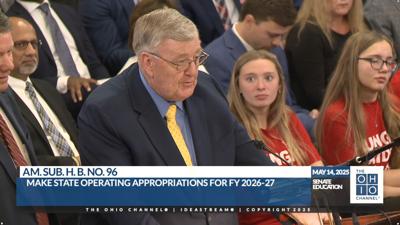COLUMBUS, Ohio (WLIO) — As the Ohio Senate continues to craft its version of the state’s next two-year budget, local school officials are urging lawmakers to consider the impact on public education funding.
Bath Superintendent Mike Estes and Treasurer Joel Parker testified this week before the Ohio Senate Education Committee, voicing concerns about proposed funding measures they say would hurt their school district.

Bath Superintendent Mike Estes and Treasurer Joel Parker testified this week before the Ohio Senate Education Committee.
One provision in the House-passed budget plan would limit school districts to carrying over only 30% of their prior year’s operating budget. Districts exceeding that threshold would be required to reduce their property tax collections accordingly.
Parker argued that carryover funds are essential for districts like Bath.
“I think there are 2 million reasons why a school might need a carryover. We've got two aging buildings. We've got boilers that need replaced. You know, in the past, we've seen budget reduction orders. We've seen COVID. We've seen the great recession. We have inflation on medical insurance. We have inflation on labor cost. You know, we want to stay off the ballot. We want a better bond rating. You know, sometimes there could be a turbulent budget process. It happens. We've seen it. There could be a loss of Ohio income tax that's debated,” said Parker.
Parker also noted that Bath will receive less state funding in the coming years.
“From (20)22 to probably to (20)27 our state share’s going from 50% to 40%. Part of the fair school funding plan has that built into it, that as property values grow, the state share is going to shrink. Our state share is shrinking. That means the locals are going to pick that piece up. We understand that. We know the budgets might get tight. I understand that. But again, I think that local control piece is a big part for us,” he added.
The Ohio Senate is expected to pass its version of the budget later this month or in June. Once approved, lawmakers from both chambers will work to reconcile the differences before sending the final version to the governor for approval.











